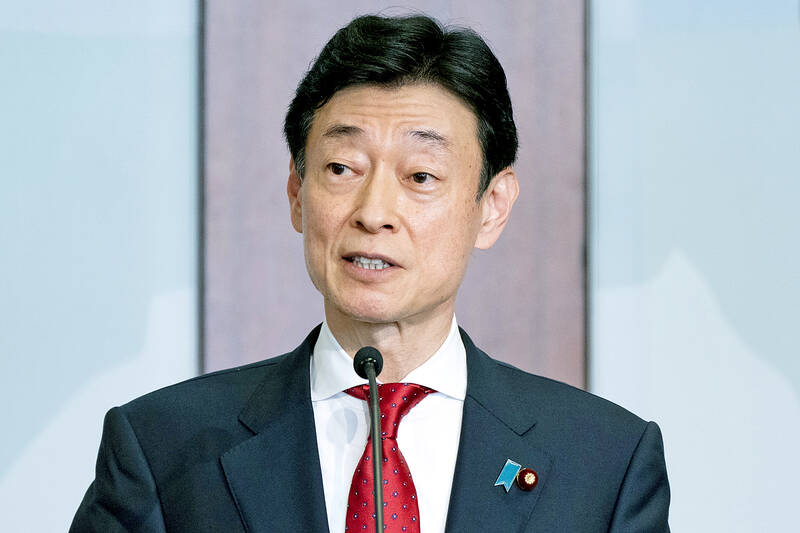Japan wants G7 countries to take a coordinated approach this year aimed at preventing the “economic coercion” that China has applied to some of its trading partners.
Actions taken by China in the past few years, such as suspending imports of Taiwanese pineapples and Australian wine, represent a “clear and present danger” for economies around the world, Japanese Minister of Economy, Trade and Industry Yasutoshi Nishimura said in Washington on Thursday.
“We expect effective responses to economic coercion will be a major item at this year’s G7 summit,” he said.

Photo: AP
Japan is the rotating head of the G7 industrial democracies this year and is scheduled to host the group’s summit in October.
Nishimura said that “countermeasures” might be necessary to help countries and regions that are the target of restrictive trade practices by authoritarian regimes.
Identifying chokepoints that could be used by such regimes would also be helpful, he added.
China has repeatedly applied economic retribution toward trading partners amid diplomatic disputes. Japan itself saw its imports of rare earths from China — crucial to a number of manufacturing supply chains — affected in 2010 following a maritime incident in contested East China Sea waters.
Beijing has criticized G7 nations for what it says are their own protectionist moves designed to prevent China’s economic rise.
The Chinese Ministry of Foreign Affairs said that export controls on semiconductors imposed by the Washington hurt the global economy and US businesses.
Late last year, China also accused the UK of abusing state power in overturning a chip-factory deal.
Nonetheless, Nishimura indicated his intention to press ahead with such policies in remarks following a meeting with US Secretary of Commerce Gina Raimondo, at which Jiji Press said they discussed cooperation on chip equipment export restrictions.
If Japan proceeds with a plan to restrict local chip equipment companies, including Tokyo Electron Ltd and Nikon Corp, from selling advanced products to Chinese customers, it would mark a major victory for US President Joe Biden’s increasingly aggressive campaign to prevent China from acquiring key foreign technologies.
Nishimura said that democratic powers made a mistake more than two decades ago in assuming that deepening economic interdependence, by bringing China and then Russia into the WTO, would “unquestionably bring about a peaceful world” following the end of the Cold War.
Rather than prosperity helping to build peace, it only increased geopolitical risks as authoritarian governments used growth and advancement to boost their power, Nishimura said.
“The free trade system ended up increasing the legitimacy of authoritarian regimes,” he said. “The illusion we embraced ended up amplifying the threat of hegemonic powers.”
At the same time, there is no way to “turn back the clock,” and a complete economic decoupling is “impossible,” Nishimura said.
He urged greater coordination among free-market democracies on measures including export controls, boosting supply chain resilience and energy security.
He also said that, given how the WTO’s dispute-settlement mechanism is now effectively crippled, Japan, the US, Europe and other like-minded partners need to “work hard on reform of the WTO.”
That would be “one of biggest challenges we need to work toward this year,” he said.

The Central Election Commission has amended election and recall regulations to require elected office candidates to provide proof that they have no Chinese citizenship, a Cabinet report said. The commission on Oct. 29 last year revised the Measures for the Permission of Family-based Residence, Long-term Residence and Settlement of People from the Mainland Area in the Taiwan Area (大陸地區人民在台灣地區依親居留長期居留或定居許可辦法), the Executive Yuan said in a report it submitted to the legislature for review. The revision requires Chinese citizens applying for permanent residency to submit notarial documents showing that they have lost their Chinese household record and have renounced — or have never

A magnitude 5.6 earthquake struck off the coast of Yilan County at 12:37pm today, with clear shaking felt across much of northern Taiwan. There were no immediate reports of damage. The epicenter of the quake was 16.9km east-southeast of Yilan County Hall offshore at a depth of 66.8km, Central Weather Administration (CWA) data showed. The maximum intensity registered at a 4 in Yilan County’s Nanao Township (南澳) on Taiwan’s seven-tier scale. Other parts of Yilan, as well as certain areas of Hualien County, Taipei, New Taipei City, Taoyuan, Hsinchu County, Taichung and Miaoli County, recorded intensities of 3. Residents of Yilan County and Taipei received

Taiwan has secured another breakthrough in fruit exports, with jujubes, dragon fruit and lychees approved for shipment to the EU, the Ministry of Agriculture said yesterday. The Animal and Plant Health Inspection Agency on Thursday received formal notification of the approval from the EU, the ministry said, adding that the decision was expected to expand Taiwanese fruit producers’ access to high-end European markets. Taiwan exported 126 tonnes of lychees last year, valued at US$1.48 million, with Japan accounting for 102 tonnes. Other export destinations included New Zealand, Hong Kong, the US and Australia, ministry data showed. Jujube exports totaled 103 tonnes, valued at

BIG SPENDERS: Foreign investors bought the most Taiwan equities since 2005, signaling confidence that an AI boom would continue to benefit chipmakers Taiwan Semiconductor Manufacturing Co’s (TSMC, 台積電) market capitalization swelled to US$2 trillion for the first time following a 4.25 percent rally in its American depositary receipts (ADR) overnight, putting the world’s biggest contract chipmaker sixth on the list of the world’s biggest companies by market capitalization, just behind Amazon.com Inc. The site CompaniesMarketcap.com ranked TSMC ahead of Saudi Aramco and Meta Platforms Inc. The Taiwanese company’s ADRs on Tuesday surged to US$385.75 on the New York Stock Exchange, as strong demand for artificial intelligence (AI) applications led to chip supply constraints and boost revenue growth to record-breaking levels. Each TSMC ADR represents